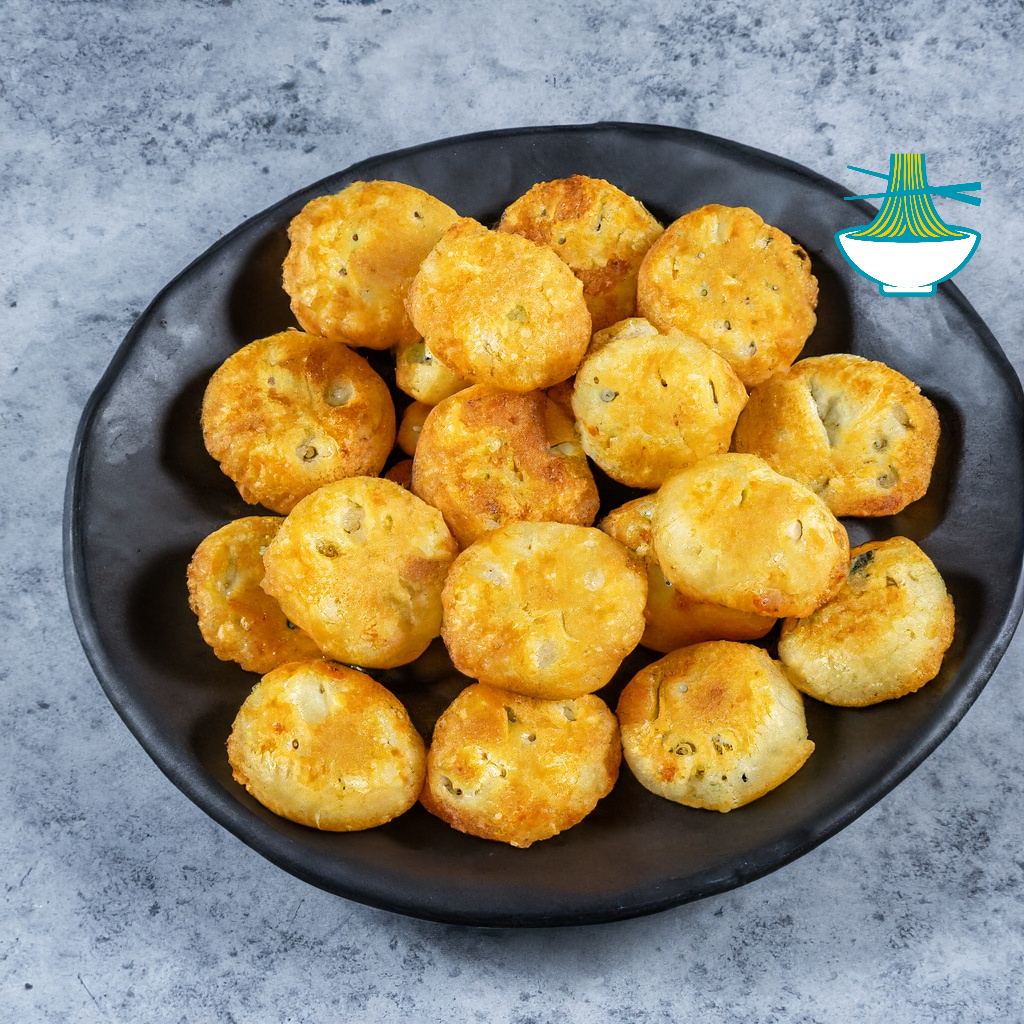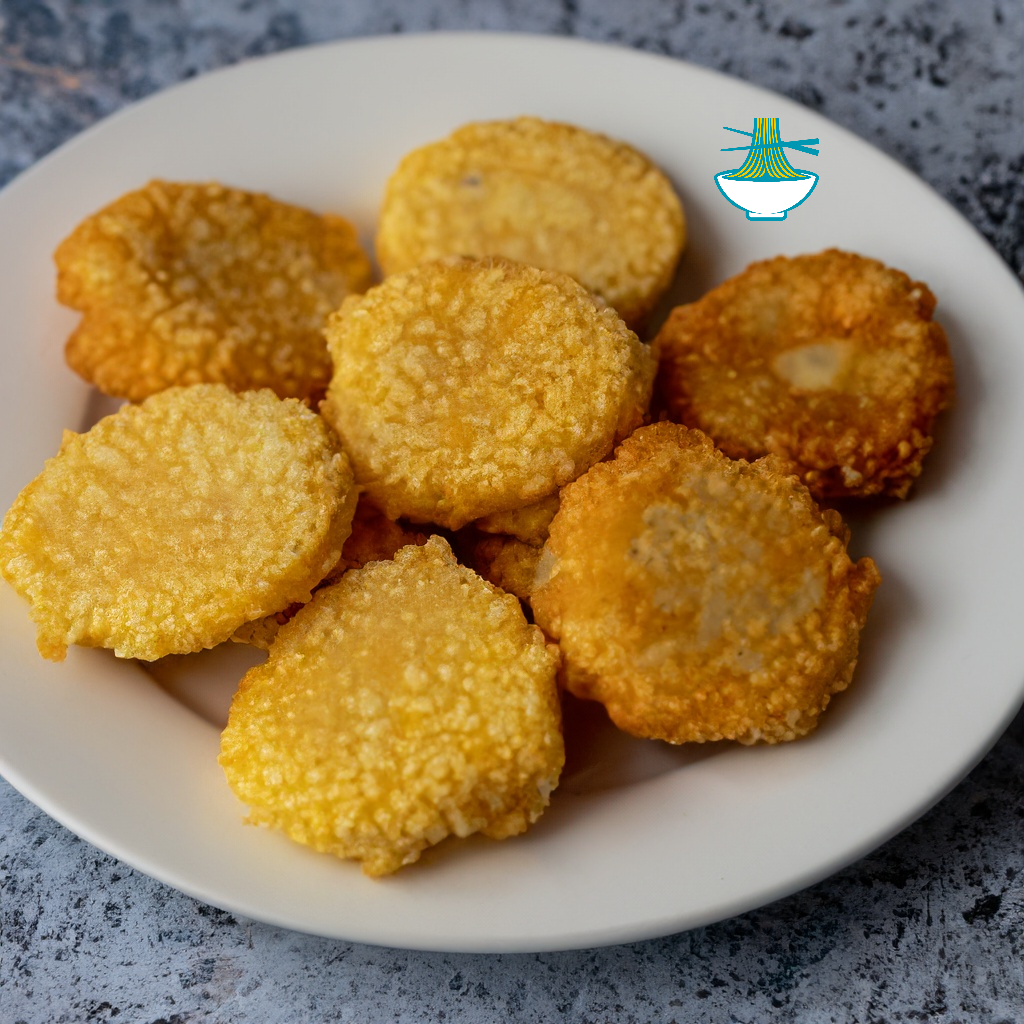Aruban Cornmeal Cakes, or Cala, are a beloved traditional dish in Aruba, known for their crispy exterior and soft interior. Beyond their delightful taste, these cakes offer nutritional value, as cornmeal is a source of essential vitamins like B-complex vitamins, which support energy production and brain health. Additionally, cornmeal contains antioxidants such as lutein and zeaxanthin, which promote eye health and combat oxidative stress in the body. Gluten-free and vegan-friendly, Cala can fit into various dietary lifestyles, but it's essential to enjoy them in moderation due to their fried preparation.
ingredients:
1- 1 cup of cornmeal
2- 1 teaspoon of salt
3- 1 cup of water
4- Vegetable oil for frying
Method:
1- In a large mixing bowl, combine the cornmeal and salt.
2- Add the water to the mixture and stir until well combined. The mixture should be smooth and slightly thick.
3- Heat the vegetable oil in a frying pan over medium heat.
4- Use a spoon to scoop out the mixture and shape it into small cakes.
5- Place the cakes into the frying pan and fry until crispy and golden brown on both sides.
6- Remove the Cala food from the frying pan and place it onto a paper towel-lined plate to remove excess oil.
7- Serve the Cala food warm and enjoy!
Note:
1- You can add other ingredients to the mixture, such as diced onions or herbs, to add more flavor to the Cala food.
2- Be careful when frying the Cala food as the oil can be very hot.
3- Cala food can also be baked instead of fried for a healthier option.
4- Consuming too much fried food can lead to excessive calorie and fat intake. The use of salt can also be problematic for those with hypertension. Moderation and healthier preparation methods can help mitigate these concerns.
Frequently Asked Questions
Can Cala be made vegan?
- Yes, the recipe is naturally vegan as it uses only cornmeal, water, and salt.
Is Cala suitable for all age groups?
- While generally suitable, adjustments like reducing salt and frying less can make it healthier for children and older adults.
What are the healthier substitutes for frying oil?
- Olive oil and coconut oil are healthier frying options, or you can bake Cala for a low-fat alternative.
Can additional ingredients be added to the recipe?
- Absolutely! Additions like fresh herbs, spices, diced vegetables, or cheese can enhance the flavor and nutritional content.
Why is Cala significant in Aruban cuisine?
- Cala represents Aruban tradition, often served during celebrations and family gatherings. Its simplicity highlights the island’s creative culinary heritage.

Nutrition Facts:
1. 1 cup of cornmeal
- Calories: Approximately 440 kcal
- Carbohydrates: 92g
- Protein: 9g
- Fat: 2g
- Sodium: 0mg (naturally sodium-free)
- Cholesterol: 0mg
- Vitamins: Good source of B-vitamins (like thiamine, niacin, folate, and pantothenic acid)
- Minerals: Rich in magnesium, iron, and zinc
Nutritional benefit: Cornmeal is a good source of complex carbohydrates, providing energy. It also offers fiber, which aids in digestion, and a variety of essential vitamins and minerals that support metabolism, red blood cell production, and overall body function.
2. 1 teaspoon of salt
- Calories: 0 kcal
- Carbohydrates: 0g
- Protein: 0g
- Fat: 0g
- Sodium: 2,300mg (100% of the recommended daily intake for sodium)
- Cholesterol: 0mg
- Vitamins: None
- Minerals: Contains sodium
Nutritional benefit: Salt is primarily used to enhance the flavor of food and help with food preservation. Sodium is essential for maintaining fluid balance and supporting nerve function, but it should be consumed in moderation to avoid excess intake, which can increase the risk of high blood pressure.
3. 1 cup of water
- Calories: 0 kcal
- Carbohydrates: 0g
- Protein: 0g
- Fat: 0g
- Sodium: 0mg (unless otherwise added to water)
- Cholesterol: 0mg
- Vitamins: None
- Minerals: May contain trace amounts of minerals like calcium or magnesium depending on the source
Nutritional benefit: Water is essential for hydration, and it supports all bodily functions, including digestion, nutrient absorption, and temperature regulation. It plays a vital role in maintaining the balance of bodily fluids.
4. Vegetable oil for frying
- Calories: Approximately 120 kcal per tablespoon
- Carbohydrates: 0g
- Protein: 0g
- Fat: 14g (with about 2g of saturated fat, depending on the type of vegetable oil used)
- Sodium: 0mg
- Cholesterol: 0mg
- Vitamins: Some oils contain vitamin E (especially sunflower, safflower, and canola oils)
- Minerals: Trace amounts of minerals depending on the oil
Nutritional benefit: Vegetable oil is a source of fats, including unsaturated fats, which are important for heart health. It also provides essential fatty acids that support brain function, hormone regulation, and cell structure. However, it is calorie-dense and should be used in moderation. The type of oil (e.g., olive oil, canola oil, etc.) can affect its overall nutritional profile.
This breakdown provides a general idea of the nutritional value for each ingredient. However, actual values can vary depending on the specific type or brand of ingredient used.


Comments